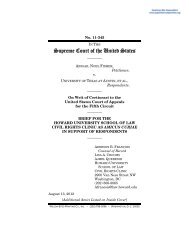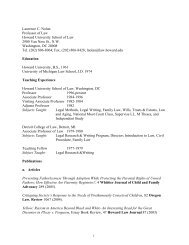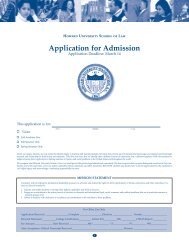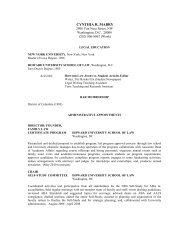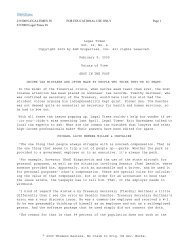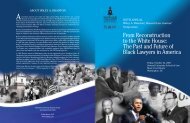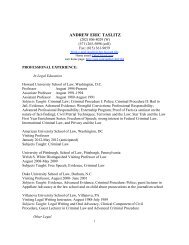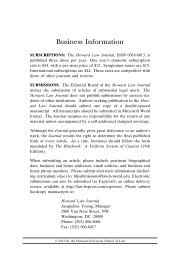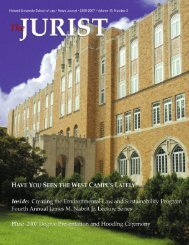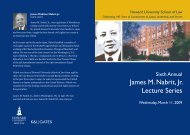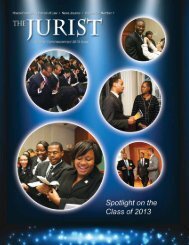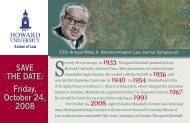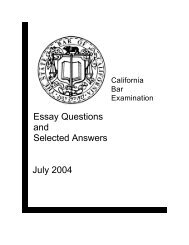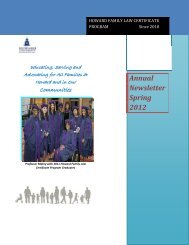Student Affairs Guide - Howard University School of Law
Student Affairs Guide - Howard University School of Law
Student Affairs Guide - Howard University School of Law
You also want an ePaper? Increase the reach of your titles
YUMPU automatically turns print PDFs into web optimized ePapers that Google loves.
Enrollment & Discipline for their temporary practice number.The IPTC has two (2) components. The seminar component includes in-depth classroomdiscussions on the federal trademark registration process. For the practical component,under strict supervision, the student-attorneys represent actual clients (i.e., individualsand/or small businesses) in their attempts to secure trademark registrations with theUSPTO.*<strong>Student</strong>s must be selected to participate in the IPTC. Visit the Clinical <strong>Law</strong> Center topick up an application and description <strong>of</strong> the process to be eligible for the IPTC.Internal Revenue Service Externship (pass/fail) (600-738) – 4 CreditsYou can only register for this course with the approval <strong>of</strong> the supervising facultymember.The seminar course exposes students to the practices, policies and procedures <strong>of</strong> the IRS,as well as the substantive tax laws that govern the work <strong>of</strong> the Service. Externs secure afield placement with the IRS’ General Counsel’s Office here in Washington, DC and areassigned to work on a variety <strong>of</strong> projects. <strong>Howard</strong> IRS Externs focus on excellence ingovernmental and public interest lawyering, social justice issues and pr<strong>of</strong>essionalresponsibility. These key components are echoed in the work done at the fieldplacement, as well as during the weekly 75-minute required classroom seminars taughtby Pr<strong>of</strong>essor Gresham.The IRS Externship is a four (4)-credit course graded on a Pass/Fail basis. <strong>Student</strong>s arerequired to work 15-20 hours per week for at least 13 weeks (or other requirement set byPr<strong>of</strong>essor Bullock). <strong>Student</strong>s may not get paid for any portion <strong>of</strong> the field placement forwhich they are receiving credit. Evaluation will be based on the student’s performance atthe placement site (by the law school supervisor and the field supervisor), participation inclassroom seminars, periodic reviews <strong>of</strong> the student’s journal, written work and/or otherassignments by the supervising pr<strong>of</strong>essor.International Business Transactions (LWIII) (600-668) - 3 CreditsThis course will explore the law applicable to doing business internationally: the nature<strong>of</strong> overseas business (e.g., agency, branch, subsidiary); transfer <strong>of</strong> capital andtechno1ogy-~ tax issues; regulation <strong>of</strong> investment and property by host governments; anddispute settlement. Applicable statutes, U.N. and OECD codes <strong>of</strong> conduct and otheragreements will be studied. Specific case studies will be used.International Economic <strong>Law</strong> (Seminar) (600-667) - 3 CreditsThis course Studies the nature, sources, and origin <strong>of</strong> international economic law and itsimpact on national law and policy .It covers Selected multilateral agreements, such as theGeneral Agreement on Tariffs and Trade, as well as the laws and disputes resulting fromtheir implementation. Particular attention is paid to the role <strong>of</strong> multilateral institutionssuch as the International Monetary Fund, World Bank, and the United Nations. TheRev. August 2012 103



